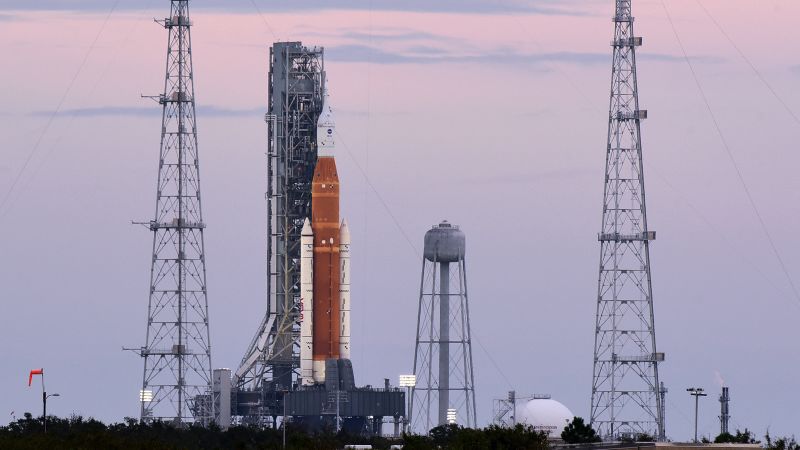Paul Hennessy/Anadolu Agency/Getty Images
NASA's Space Launch System rocket with the Orion spacecraft is pictured here on Launch Pad 39B as final preparations are made for the November 2022 launch of Artemis I from Kennedy Space Center in Cape Canaveral, Florida.
CNN
—
NASA leadership on Tuesday is expected to announce a “months-long delay” to the first crewed mission for the agency's flagship Artemis program, according to a current and former NASA employee.
The delay affects NASA's Artemis 2 mission, which aims to send four astronauts on a mission to fly near the moon and was scheduled to launch next November.
But the mission is no longer expected to be completed before 2025, according to the sources, confirming months of speculation that a delay is imminent.
NASA's inspector general hinted at potential mission delays in a report issued in November, citing three major challenges the space agency must address before it can safely transport humans to the moon.
First, the ground structure used to build, transport and launch the program's massive Space Launch System rocket — called Mobile Launcher 1 — sustained “more damage than expected.”
The November report stated that repairs to the structure were continuing.
Second, the heat shield on the Orion spacecraft — which was supposed to be home to the Artemis 2 astronauts — eroded “in an unexpected way” during Artemis 1 as it was exposed to temperatures roughly half the surface temperature of the Sun upon its reentry into the atmosphere. Earth's atmosphere.
Finally, the inspector general pointed to what NASA officials believe is the “primary critical path” for the Artemis 2 mission: preparing Orion for its first crew and integrating it with the European Service Module, which provides power and propulsion. The “critical path” in project planning refers to the aspect of a task that is expected to take the longest time.
The Artemis 2 mission was to build on the successful completion of the Artemis 1 mission, an uncrewed test flight that sent NASA's Orion capsule on a 1.4 million-mile journey to orbit the Moon. That trip ended in December 2022.
The Artemis 2 mission is scheduled to be the first time humans have orbited the Moon since the end of the Apollo program. the crew, Announced in Aprilfeaturing NASA's Reed Wiseman, Victor Glover and Christina Koch, plus Canadian Space Agency astronaut Jeremy Hansen.
The flight is expected to last about 10 days, and will send the crew beyond the moon, potentially farther into space than any human has ever traveled, although the exact distance has not yet been determined.
Artemis 2 is expected to pave the way for the Artemis 3 mission later this decade, which NASA has pledged will put a woman and a person of color on the moon for the first time. It will also be the first time humans have landed on the moon since the Apollo program ended in 1972.
NASA has targeted A Launch date 2025 As for Artemis 3, although the space agency's inspector general has already said a delay would likely push the mission back. 2026 or later.

“Amateur organizer. Wannabe beer evangelist. General web fan. Certified internet ninja. Avid reader.”




/cdn.vox-cdn.com/uploads/chorus_asset/file/25550621/voultar_snes2.jpg)


More Stories
Watch a Massive X-Class Solar Explosion From a Sunspot Facing Earth (Video)
New Study Challenges Mantle Oxidation Theory
The theory says that complex life on Earth may be much older than previously thought.